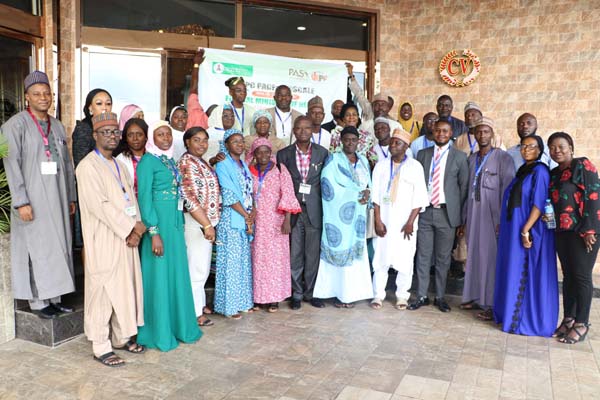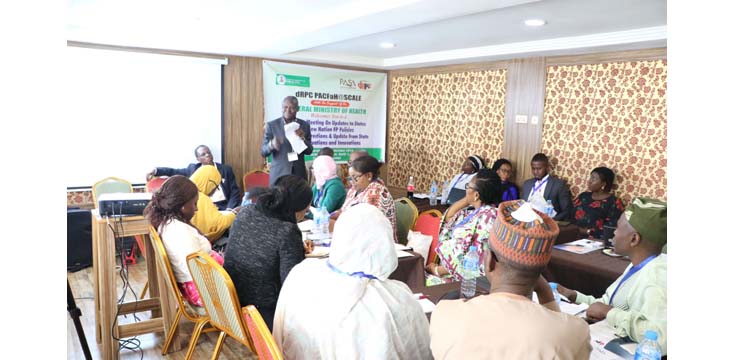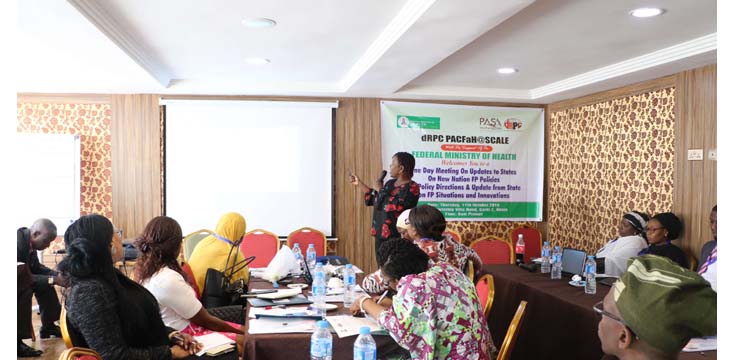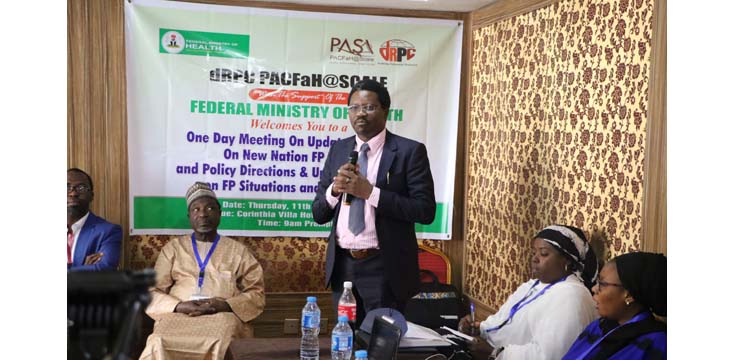IN-DEPTH: Stakeholders push for gender integration in Nigeria’s family planning policies
Nigerian family planning stakeholders last week gathered in Abuja at a high-level meeting convened by the development Research and Projects Center (dRPC) and Federal Ministry of Health (FMoH) and deliberated on strategies for bridging the gender gap in policymaking and implementation for family planning in Nigeria

Research has shown how gender norms affect healthcare outcomes in family planning, thus gender-based violence and poor access to resources also affect access and quality of FP services available among women and girls. However, there is a huge gender gap when it comes to policymaking and policy implementation for family planning and reproductive healthcare in Nigeria.
It was against this backdrop, and as part of efforts to integrate gender inclusion in policymaking and implementation for family planning in Nigeria that stakeholders including government officials from federal and states governments, academia, professional groups and civil society gathered in Abuja last week Thursday, for a one-day high-level meeting pushing for gender integration in the context of FP and reproductive health.
The high-level meeting was convened by the development Research and Projects Center (dRPC) under the Partnership for Advocacy in Child and Family Health at Scale (PACFaH@Scale) project, in partnership with the Federal Ministry of Health (FMoH); it deliberated on and analyzed FP and reproductive health policies in Nigeria, from the perspective of gender sensitivity.
PACFaH@Scale or simply PAS is a five-year health and social accountability project funded by the Bill and Melinda Gates Foundation (BMGF) which advocates to the executives and legislatures at federal, states and LGA levels the need to fulfill their service and social compacts with the citizens, fulfill promises made and implement policies, laws and regulations that have positive health impacts on the people.
At the crux of the PAS advocacy – which is being implemented in the states of Anambra, Enugu, Kaduna, Kano, Lagos, Niger, Rivers and Taraba – is the demand for increased and sustained funding of primary healthcare (PHC) and public health in general, including family planning and reproductive health, in Nigeria.

Dr Emmanuel Abanida, Senior Technical Adviser at dRPC-PAS while stating the objectives of the high-level meeting, on behalf of the Executive Director of dRPC, said the meeting was majorly aimed at addressing gender-related injustices in FP policymaking and implementation at federal and states’ level in Nigeria.
“This meeting is to enable all family planning stakeholders get familiar with policy documents on family planning and have a meta-analysis of them. To enable us engage ourselves in the new directives of FP, and to ensure that we implement the National FP Blueprint. We want to look at performance indicators, family planning budgets and its implementation, state governments’ policies, roles of Civil Society Organizations (CSOs) in FP policymaking as well as get people to begin to talk about FP,” said Dr Abanida.
While providing a gender assessment of FP and child healthcare policies and projects in Nigeria, Joyce Ahmadu, a gender expert, analyzed Nigeria’s FP policies from a gender perspective looking at how FP policies and projects had addressed or responded to gender dynamics and inequalities i.e gender roles, norms and regulations – in the context of policymaking and implementation.
“Gender role refers to what males and females should do within the society. The role of women which include taking care of the home and family affects the ability of women to seek healthcare. This unequal gender-based responsibility leads to gender violence. The gender norms also affect health seeking behavior and all these serve as barriers to women’s access to health and FP,” she said.
Ms Ahmadu, who also analyzed gender in the context of reproductive health policies in Nigeria, stated that an understanding of gender norms was important in determining whether an FP policy was gender sensitive or not; she emphasized the importance of gender integration in FP policy development processes.
“Gender integration is very important in policymaking for FP; gender roles, norms and regulations pose barriers to women’s access to healthcare services including FP. So, if the policies, which form the basis for FP intervention in the country, do not take into cognizance those issues, we will not have interventions focused on removing those barriers for women,” she said.

She decried the fact that policy formulation for FP in Nigeria always failed to take into cognizance gender equity issues, even though most of the agencies and parastatals under the Federal Ministry of Health (FMoH) had gender units adding that both the FMoH and Ministry of Women Affairs were, most often, not being involved in policy matters – the consequences of which is absence of gender-sensitivity in policy formulation and implementation.
Ms Ahmadu then provided a review of nine FP-related national policy documents which included the National Reproductive Health Policy (2017); Draft National Health Policy (2016); the Draft Child Health Policy (2018); the Draft National Strategic Development Plan II (2017-2021); Nigeria Family Planning Blueprint (Scale-up Plan) 2014, as well as the Nigeria Strategy for Immunization and PHC System Strengthening (2018-2028).
Other FP-related policy documents she reviewed were the Draft Reproductive Maternal, New-Born, Child Adolescent Health & Nutrition Strategy (2017-2012); Implementation Guidelines for PHC under one Roof (2018) and National Guideline for the Implementation of Integrated Community Case Management of Childhood illness in Nigeria (2013).
Four of the nine policy documents reviewed by Ms Ahmadu were still in draft form. However, in an interview with African Newspage, she expressed optimism over their adoption by the government. “The Nigeria FP Blueprint is under review, so it is an opportunity to continuously engage the FMoH to see how the policy can include gender and address gender issues. It is an opportunity for PAS to ensure gender inclusion in the Nigeria FP Blueprint,” she said.
While enumerating the obstacles to access and uptake for FP services by women in Nigeria, Ms Ahmadu decried the fact that women themselves couldn’t take decisions concerning their health which she said was a major barrier adding that because women were also engaged in household chores, from morning to evening, they lacked the time to attend healthcare facilities and access FP services.
While speaking on men’s role in ensuring women’s access to FP services, she said, “Men see family planning activities as women’s affairs, which is not supposed to be so. It is a family issue, and decisions should be made collectively. That is why we are promoting shared decision-making in FP and the incorporation of men into family planning policies, which will play a significant role in increasing access for women.”

While delivering a paper on ‘FP financing at national level’, Dr Kayode Afolabi, Director and Head of Reproductive Health Unit at the Federal Ministry of Health, who represented the Honorable of Minister of Health Prof Isaac Adewole, at the meeting acknowledged that “if we deploy FP fully by ensuring access to FP commodities, 30 per cent of maternal mortality and 25 per cent of under-five mortality can be prevented, by contraceptives and FP.”
As Africa`s most populous nation, Nigeria has an estimated population of 200 million people, 67% of which is made up of women, whose fertility rate stands at 5.5%. According to the 2006 national census, not less than 44 million Nigerian women were of reproductive age. Yet, the 2013 National Demographic and Health Survey (NDHS) show that only 15.1% of married women of reproductive age were using any form of contraceptive.
Family planning is one of the most effective ways of preventing maternal, infant and child mortality. It helps reduces maternal mortality by reducing the number of unintended pregnancies and abortions. The five-year Nigeria Family Planning Blueprint (Scale-Up Plan), 2014–2018 is a concerted national effort to scale-up access to FP which evolved from the commitments made at the July 11, 2012 FP summit in London. It provides a clear roadmap for improving access to FP and reducing maternal mortality in Nigeria.
“But the question is how do we achieve it?” Afolabi asked. “We need to promote availability of new contraceptive model in line with the global trend. We are trying to review the roadmap we are using in FP policies. We are also happy that the media is here because we have over 300 PHC in the country and most of the women are not accessing it.”
There has been significant progress in Nigeria since around 2014 when the FP Blueprint was developed and its implementation began. Thus, there has been a gradual increase in the financing for FP in the country. However, there exist many gaps in Nigeria’s FP funding landscape; the country has not been fulfilling its pledges for the FP basket fund. It pledged a total of $12 million over a four year period ($3 million per year) unfortunately, the sum total of funds released so far are to the tune of $7 million, only.
Afolabi, however said the United States Agency for International Development (USAID) had been consistent in mopping up the gaps in FP funding in Nigeria adding that the Honorable Minister of Health had this year (2018) pledged the sum of $4million for FP and also assured that the federal government would make payment for the pledged funds in bulk – and not in instalments – as it used to be.
He said the fact that budgetary allocation for FP was increasing in Nigeria even as budgetary allocation for the entire public health was decreasing, showed their commitment to improving availability and uptake of FP services by women and girls in the country. Nigeria’s health sector budget for 2018 is a paltry 4 per cent of the entire national budget.
Afolabi spoke of an ongoing effort to improve domestic funding for FP which he said had commenced with an advocacy visit to the Budget Office of the Federation (BOF) which he also said had begun to yield positive results.
“This is why there has been an increase. Also, there is a renewed MoU with UNFPA to grow sustainable funding through an annual government counterpart contribution of $4 million from 2018 to 2021. A total of $56 million will be disbursed to states through IDA loans and Global Financing Facility (GFF), from 2017 to 2020,” he said.
“The government is investing in a robust accountability system to track and report actual domestic resources expenditure at national and state levels. Accountability is very important because that is how we can know what the government is spending especially on human resource.”
There are huge unmet needs for FP services in Nigeria and the highest is in Kano state, which is also the most populous state in Nigeria, where there are lots of women who are in need of FP services but cannot access it due to a combination of barriers such as lack of reachable facilities and FP commodities, spousal disagreement, misconceptions and fear of the unknown, unavailability of contraceptive choices, amongst others.
Speaking to this correspondent on efforts being made by Kano to break the barriers and increase uptake for FP services, Hajiya Sa`a Nata`ala, the Kano State Reproductive Health and Family Planning Coordinator, said: “We have male motivators who counsel people during social gatherings such as naming ceremonies on the dangers of multiple pregnancies without adequate spacing.”
Nata`ala however, lamented the non-release of funds meant for family planning programmes by the Kano state government. “Family Planning programmes in Kano are funded through budget and we have seen an increase in allocation over the years, however the money is not being released. Money was only released once – during the immediate past regime in the state,” she said.
No doubt, gender-inclusive policies and sustainable funding mechanisms driven by a strong political will be pivotal in achieving the successful implementation of the Nigeria Family Planning Blueprint. For this to be a reality, all stakeholders including members of the civil society and media need to intensify advocacies for increased budgetary allocation for health, which also means increased funding for family planning.
Some of the recommendations made by stakeholders at the high-level meeting were the need for use of data for policymaking on FP; domestication of Task Shifting Task Sharing (TSTS) policy at states’ level; addressing the shortage of skills providers as well as improving the society’s perception of female education and empowerment.












